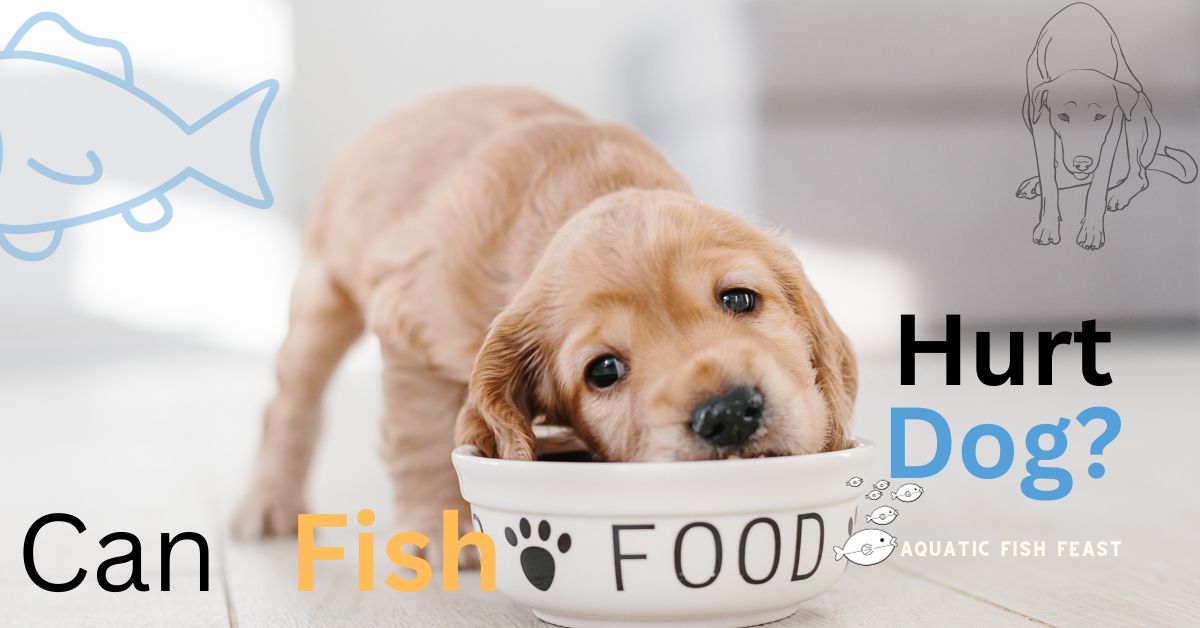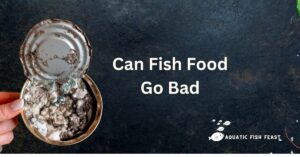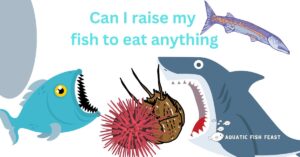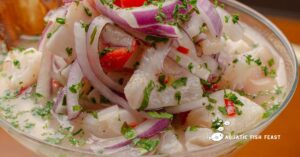Do you want to know if fish food can hurt dogs? I will tell you how to know if fish food can hurt dogs.
Dogs are curious creatures who frequently consume items they are not intended to consume.
They can’t stop themselves from eating other people’s food, and fish food is no exception.
These voracious critters like fish food and will not need a second invitation to sample it.
Seeing your dog eat fish food does not necessitate an instant trip to the doctor.
Although there are no long-term hazards, keeping fish treats away from your dog is best.
But that’s not all; keep reading to learn more about the above subject, ‘Does fish food harm dogs,’ and much more.
Now, let’s get started.
Read Also: Can Fish Food Cause Cloudy Water.
Table of Contents
Is Fish Dog Food Bad For Dogs
The digestive system of your dog is far more robust than your own.
Because of this, it can typically tolerate the filthy water in the pond and the occasional garbage smorgasbord.
However, it is not a foolproof method, and several things are unexpectedly frequent in the human diet that are particularly poisonous to dogs.
In light of this, it is essential to take precautions if your dog consumes food unprepared for it.
It is not unheard of for dogs to consume food intended for fish.
Several internet discussion groups are stuffed with tales of dogs that accidentally ingested goldfish pellets yet did not suffer long-term health consequences.
Fish meal is one of the more innocuous banned snacks for dogs compared to others, such as other types of snacks.
This is true; some dogs are allergic to eating chicken, and you should know what meals to substitute with fish instead of giving them chicken.
However, for your dog’s health and safety, know the best foods that go well with them and those you should eat and not eat.
Can Dogs Eat Catfish Food
If your canine companion does not suffer from dietary sensitivities, feeding them catfish should be OK.
It is an excellent source of protein, which can promote good skin for your dog.
Consuming filets of catfish is linked to other additional health advantages.
Taking this product aids in preserving optimal cognitive function in canines, facilitates the development of lean muscular mass, and supplies a source of organic vitality.
There is no need for concern over excessive amounts of mercury or other heavy metals.
In general, catfish does not include any of these items.
Based on my knowledge so far from this many years in the aquatic field, There is no concrete difference in health risks associated with consuming either catfish in the wild or catfish raised in an aquaculture facility.
However, as I will always advise, consult your family doctor or a veterinary professional if you have any concerns regarding the well-being of eating catfish.
Read Also: Can Fish Food Go Bad.
What Dogs Cannot Eat Fish
It is not a good idea for your dog to consume any giant fish or fish with a lengthy lifespan.
Here is a list of large species that you don’t need to feed your dogs with or that dogs should not eat them.
They are swordfish, tilefish, king mackerel, and albacore tuna fish, which are known to have heavy metals; due to the high levels of mercury found in their systems, all these fish should not be fed to dogs.
When I am unsure of what types of human foods to add to my dog’s diet, I quickly ask for help from a specialist rather than making decisions on my own that could harm my dogs. And when you don’t know too you should always check with your veterinarian first.
To be precise, certain human meals have provoked adverse reactions in dogs.
This article is intended to provide readers with educational and informative content; it is not intended to replace professional medical or nutritional guidance.
What Are The Potential Risks Of Serving Fish To Your Dog
Even though fish may be suitable for your dog’s health, there are some risks to giving it fish.
There are several risks associated with giving your dog fish, including the following:
1. Food allergies: Despite fish being a natural source of protein, some dog breeds have allergic reactions to eating fish than others.
2. Hazardous bacteria: When dogs eat raw fish, they risk eating dangerous germs (such as listeria or salmonella); this can cause them to vomit, cause a bloated stomach, and sometimes even diarrhea.
3. An excessive amount of oil: These are mostly found in fish canned and packed in fat. Like the anchovies or sardines, they should not be fed to dogs.
This is mostly because excessive amounts of oil have been linked to health problems such as obesity and pancreatitis, even in humans.
4. Parasites: Raw food could be contaminated. If your dog eats raw fish, he will likely get intestinal parasites. These common parasites are flukes, roundworms, and tapeworms.
It can also make them throw up, cause diarrhea, and sometimes make them lose weight. Although most dogs also enjoy eating raw foods without having issues.
5. Fragile bones: Fragile fish bones, which are unlikely to be detected by people when eating raw fish, are a danger, pose a choking risk for dogs, and even cause harm to their internal organs. Your dog’s mouth is susceptible to being pierced by bones.
What Foods Contain Fish Meal And Do Dogs Like Them
Cats consume food that is based on fish more frequently than dogs.
As a consequence of this, fish meal is most frequently discovered in new protein diets as well as allergy-friendly diets.
Feeding a dog a meal containing novel sources of protein and carbohydrates that its body has never seen before is used most frequently for diagnosing food sensitivities in canines.
If a dog exhibits indications of food allergy or possesses a sensitive gastrointestinal tract, it may be prudent to contemplate including a fish-based dietary regimen as a viable option.
When used in dog food, the concentrated fish meal has a propensity to emit a powerful odor, which others could find offensive.
On the other hand, dogs rarely show any aversion to the scent.
Even if the diet’s primary supply of protein comes from a different source, a fish meal may still be utilized in diets as a source of omega-3 and omega-6 fatty acids.
It just comes down to personal taste as to whether or not a dog likes eating food prepared with fish meal.
Fish meals can improve the flavor of dog food, but not all dogs enjoy the flavor it imparts.
Why Do Dogs Like Fish Food
Fish has a distinct odor that dogs find irresistible, and there’s a good reason.
Fish is frequently used in commercial dog food as a substitute for other protein sources since it is a nutritious source of protein.
Some veterinarians theorize that the omega-3 fatty acids found in fish could have health advantages, including anti-inflammatory effects.
Dogs that suffer from food allergies to more standard components, like chicken, may relieve their symptoms by eating fish instead.
Suppose you want to give your dog a homemade meal that includes fish.
In such a situation, see your doctor or a veterinary nutritionist who has passed the board certification exam to ensure your dog gets the proper nutrients.
Fish may be an essential component of a home-cooked diet.
When you offer your dog fish for the first time, give only a tiny piece until you decide whether or not your dog can take that specific fish without having an allergic response or an upset in their digestive system.
Final Thought
Now that we have established That fish food can hurt dogs, the components in fish food are not hazardous to your canine companion.
As a result, if your dog swallows your goldfish’s dinner, there should be no long-term health consequences.
However, you may experience an adverse or, in rare situations, an allergic reaction. As a result, vigilance is required.
Read Also: What Can Fish Eat Besides Fish Food.




